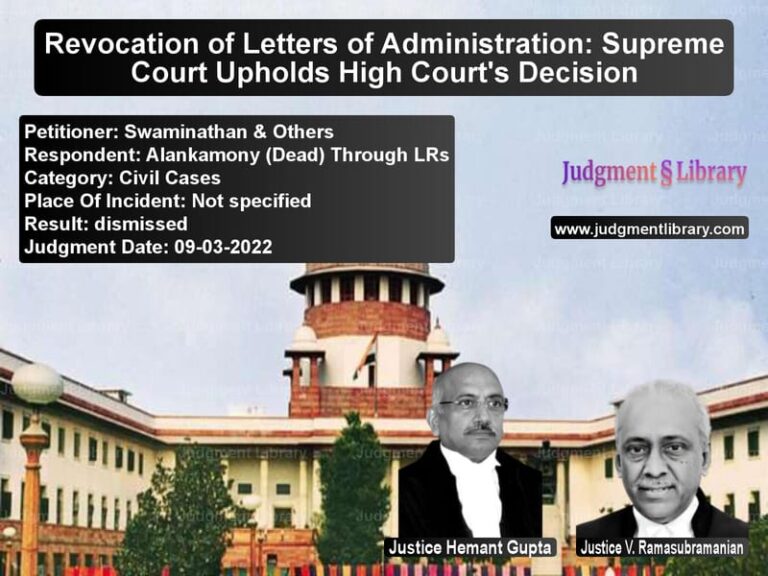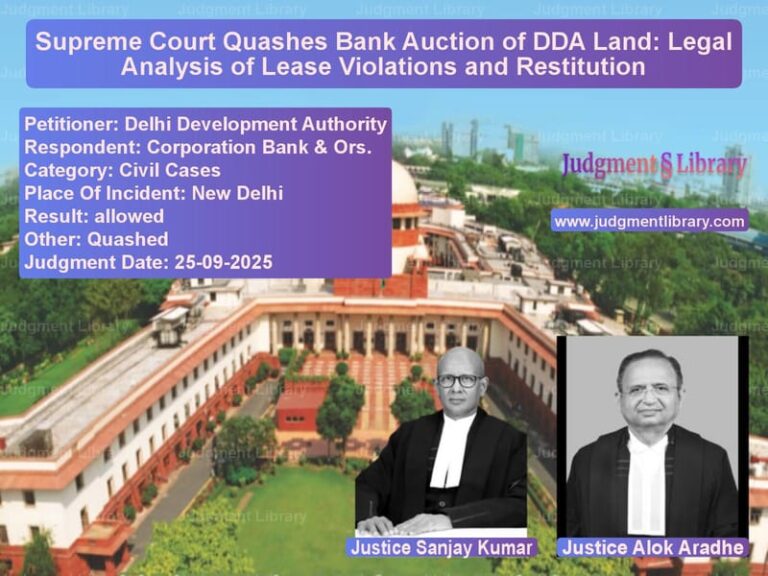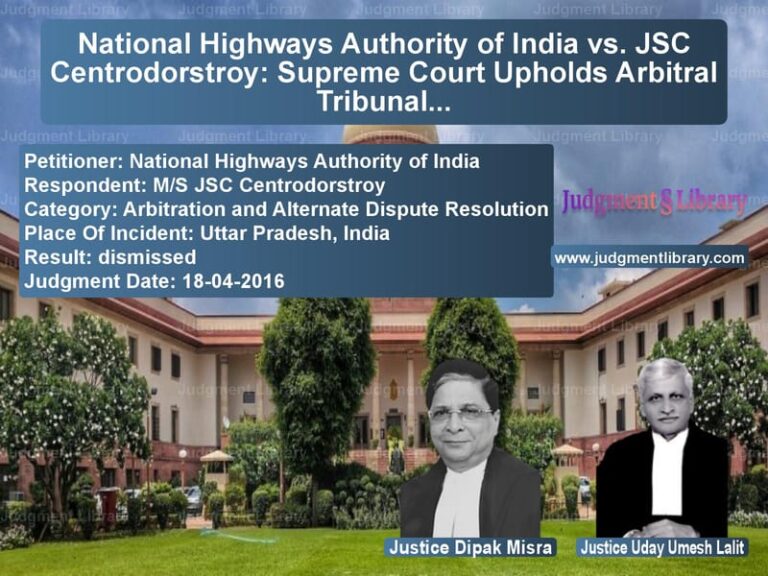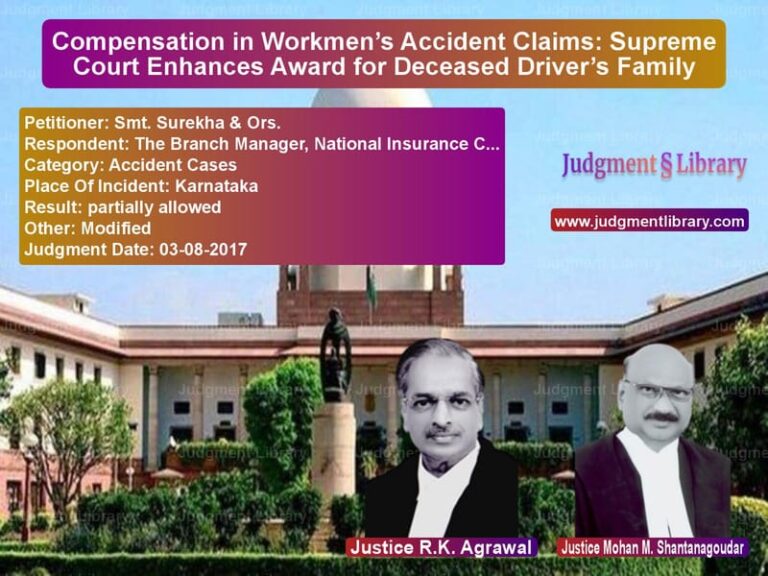Supreme Court Upholds Conviction for Murder in Dying Declaration Case
The case of Bhagwat v. State of Maharashtra revolves around a conviction for murder under Section 302 of the Indian Penal Code (IPC) based on the deceased’s dying declarations. The appellant, Bhagwat, was convicted for the murder of his wife, who suffered fatal burn injuries in the marital home. The key issue was whether the dying declarations of the deceased could be relied upon as evidence for conviction, given the inconsistencies between the different declarations made by the deceased.
Background of the Case
On 6th April 2003, Bhagwat’s wife was found with severe burn injuries in their home. She passed away the next day, and Bhagwat was accused of causing her death by setting her on fire. There was no eye witness to the incident, but three different dying declarations were made by the deceased before her death. These declarations varied significantly, raising doubts about their reliability and whether they could form the basis of a conviction.
The first declaration was made to a police officer at the hospital, where the deceased claimed the fire was accidental. The second declaration was made orally to relatives, where the deceased blamed her husband for setting her on fire. The third declaration was made to a Special Judicial Magistrate (PW-7), which also blamed the appellant, Bhagwat, for causing the fire. This was the declaration that was used to convict Bhagwat, as it was recorded in the presence of the Magistrate.
Legal Issues in the Case
- Whether the dying declarations made by the deceased were consistent and reliable enough to form the basis for the conviction of the appellant.
- Whether the inconsistencies between the different dying declarations affect their admissibility as evidence in the case.
- Whether the appellant’s actions and behavior after the incident, including his absconding for three months, indicated guilt.
Arguments by the Appellant
The appellant’s counsel argued that:
- There were three inconsistent dying declarations, and the reliance on the third one was erroneous. The first declaration, made to a police officer, was inconsistent with the subsequent declarations, suggesting that it was made to protect the appellant.
- The deceased may have died as a result of accidental burns, and there was no clear evidence to prove that the appellant intentionally set her on fire.
- The appellant’s actions after the incident, including his absconding for three months, did not support the conclusion that he was guilty of murder. The appellant’s alleged burn injuries were dismissed as implausible after such a long period.
Arguments by the Respondent
The State of Maharashtra, represented by the prosecution, argued that:
- The third dying declaration, made before the Special Judicial Magistrate, was consistent and corroborated by medical evidence and the testimony of the doctor (PW-8), who certified the fitness of the deceased to make the declaration.
- The appellant’s failure to explain how the deceased met her death inside the house and his subsequent absconding were significant factors that undermined his defense.
- There was no evidence to support the claim of accidental burns, and the injuries suffered by the deceased were consistent with deliberate harm.
Supreme Court’s Observations
The Supreme Court thoroughly examined the arguments and evidence presented by both sides. The Court noted that:
- The first dying declaration was made to a police officer but lacked proper certification and corroboration from the doctor who should have attested to the deceased’s fitness. The Court considered it to be unreliable.
- The second declaration made to the relatives was oral and could not be considered conclusive. Moreover, this declaration included the accusation of dowry demand, which was not supported by other evidence, and therefore, was not given much weight.
- The third dying declaration, recorded by the Special Judicial Magistrate, was found to be reliable. The Court emphasized that the declaration made in the presence of a Magistrate was the most credible, as it was made in a formal and controlled environment. It was corroborated by the testimony of the doctor, PW-8, who had confirmed the deceased’s fitness to give the statement.
The Court further observed:
“The third dying declaration, which was recorded by the Special Judicial Magistrate and proved by PW-7, is the most credible and should be relied upon. Inconsistent statements made earlier are less significant when there is corroboration from the Magistrate.”
Final Verdict
The Supreme Court upheld the conviction of the appellant under Section 302 of the Indian Penal Code. The Court ruled:
- The appellant was guilty of murder based on the credible third dying declaration made by the deceased.
- The appellant’s behavior, including absconding after the incident, and the failure to explain how the deceased died in his house further indicated his guilt.
- The appeal was dismissed, and the conviction was upheld. The appellant’s sentence was confirmed as life imprisonment.
The Court concluded:
“The conviction of the appellant under Section 302 IPC is upheld, and the appeal is dismissed.”
Conclusion
This case highlights the importance of dying declarations in criminal cases, particularly where there are no direct witnesses to the crime. The Supreme Court reaffirmed the principle that the dying declaration of a deceased person can be admissible as evidence, provided it is made in a proper and reliable manner, such as in the presence of a Magistrate. The ruling also underscores the Court’s commitment to maintaining the integrity of the judicial process by prioritizing credible evidence over inconsistent statements, and by considering the conduct of the accused in determining guilt.
Petitioner Name: Bhagwat.Respondent Name: State of Maharashtra.Judgment By: Justice Navin Sinha, Justice K.M. Joseph.Place Of Incident: Maharashtra.Judgment Date: 19-09-2018.
Don’t miss out on the full details! Download the complete judgment in PDF format below and gain valuable insights instantly!
Download Judgment: Bhagwat vs State of Maharashtra Supreme Court of India Judgment Dated 19-09-2018.pdf
Direct Downlaod Judgment: Direct downlaod this Judgment
See all petitions in Murder Cases
See all petitions in Bail and Anticipatory Bail
See all petitions in Custodial Deaths and Police Misconduct
See all petitions in Judgment by Navin Sinha
See all petitions in Judgment by K.M. Joseph
See all petitions in dismissed
See all petitions in Quashed
See all petitions in supreme court of India judgments September 2018
See all petitions in 2018 judgments
See all posts in Criminal Cases Category
See all allowed petitions in Criminal Cases Category
See all Dismissed petitions in Criminal Cases Category
See all partially allowed petitions in Criminal Cases Category







